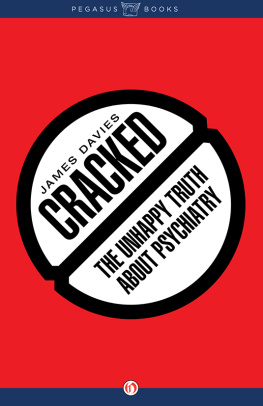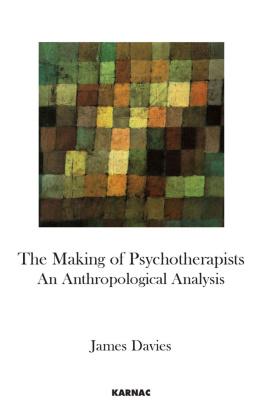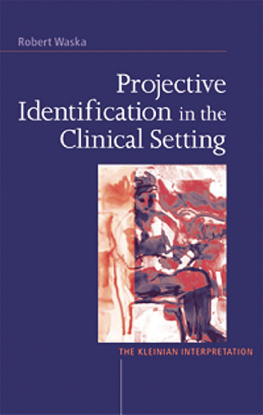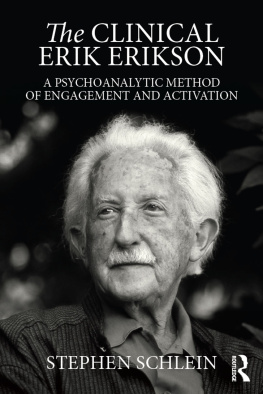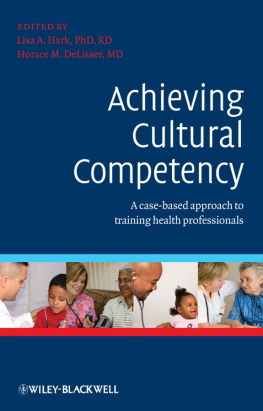The Making Of Psychotherapists
An Anthropological Analysis
James Davies
First published 2009 by Karnac Books Ltd.
118 Finchley Road London NW3 5HT
James Davies
The moral right of the author has been asserted.
All rights reserved. No part of this book may be reproduced or utilised in any form or by any means, electronic or mechanical, without permission in writing from the publisher.
British Library Cataloguing in Publication Data A C.I.P. is available for this book from the British Library.
ISBN-13: 978-1-85575-656-4
www.karnacbooks.com
The process of writing a book is rarely free of all difficulty. To the following people I owe a great debt of gratitude for helping me through the more demanding times. I first wish to thank Professor David Parkin for his kindness, goodwill, and invaluable guidance, as well as for providing me with the priceless example not only of how a scholar should work (but also, unbeknown to him) of how a scholar should be. What a precious model he provided. I am also greatly indebted to my discussions with Dr Matias Spektora most dear friend and always a positive force behind the scenes. Important others who challenged and/or helped me were especially Dr Ben Hebbert (a true companion), Dr Audrey Cantile, Dr Elisabeth Hsu, Professor Wendy James, Professor Roger Goodman, Dr Maria Luca, Professor Tanya Luhrmann, Professor Andrew Samuels, Professor Peter Fonagy, Joe Yarbourgh, Rob Waygood, Professor Roland Littlewood, Dr Adrianne Baker, Dr Simcha Brooks, Professor Richard Sholzt, Mark Knight, Nancy Browner, and, more recently, Rev James Wilkinson. To all of you I offer my deepest gratitude. Finally, I owe especial thanks to Dr Karem Roitman who gave me the great benefit of her close reading of the text, her sensible advice, astute commentary, as well as her tireless encouragement and support.
I must also thank the training institutes that allowed me access to their staff and students, and all the interviewees and informants who kindly gave up their time for the benefit of this research. I wish to thank for their assistance the librarians at Regent's College
School of Psychotherapy and Counselling, the Institute of Psychoanalysis, Oxford University, Senate House (University of London), Cambridge University. My gratitude also to my colleagues and students at Roehampton University, and especially to Professor Del Lowenthal for his constant backing and encouragement.
Financial help for this book came through the generous assistance of the Equity Trust Fund (John Fernald Award), and from various sources from St Cross College and the University of Oxford to all these benefactors I am greatly indebted. I also owe deep gratitude to the staff and members of St Cross College, Oxford, whose kind and stimulating company (often during a lunch) offered solace during the dips in research.
Finally, I wish to thank my parents and family for their support, encouragement and love. If this book is to be dedicated to anyone at all, then let me dedicate it to them.
I n this book I shall analyse from an anthropological perspective the training of psychoanalytic psychotherapists. I undertake this anthropological task since psychotherapy not only constitutes a clinical practice, a professional association, and a way of making a living, but also a moral and cultural community with wide social influence and standing. If we wish to study how the values, practices, and knowledge of this distinct community are maintained and reproduced over time, we must investigate the sites, the training schools, where these cultural forms are transmitted. In this book I offer a detailed survey of the hidden institutional devices used in psychoanalytic training to help reproduce this world of shared practice and meaning. I ask why and how such devices are used, I discern their meaning and consequences, I explore how they profoundly alter the outlook of trainees and practitioners, and finally I show how they shape the fortunes and functioning of the therapeutic community itself. By taking the reader by the hand through the core stages of therapeutic training, while at the same paying close attention to what trainees do, say and feel as they pass through these stages, we will see how professional training not only grooms trainees as practitioners, but as specific types of persons who also become the main agents of community maintenance. We will see how trainees are coaxed into supporting an avowedly secular enterprise that can offer rewards (i.e. a new orientation to life, increased status and a deep sense of belonging) reminiscent of certain political or religious movements; an enterprise
which also advances behind its professional fagade a robust 'political' and 'ideological' regime of wider social ambition and significance. We will see, then, how these training institutes, or what I refer to as institutions of affirmation, work to create practitioners who will sustain the values and hegemony of the psychoanalytic tradition itself, usually vis-a-vis other therapeutic institutes and schools. Whether institutes are successful in their aims, and whether these aims are actually proving to undermine the status and standing of the profession itself, are other important questions I shall explore.
This book, then, is not only written for social/cultural anthropologists interested in the new field of 'professional socialisation' (the study of how professional institutions transform persons and social practices, as well as create social structures), and for psychotherapists who wish to understand why their community is divided internally as well as set against more powerful social institutions (medicine and academe), but also for current and prospective students of psychotherapy who wish to understand the formidable institutional forces to which they are invariably subject; forces which leave their inevitable imprint not only upon their clinical/professional practices and beliefs but also upon their deeper subjective selves. Finally, it is hoped that for those with a general interest in psychotherapy this book will offer a stimulating introduction to the behind-the-scenes features of this alluring professional world.
Anthropology of Professional Socialisation
Studying how powerful institutions (training or otherwise) transform the subjectivities of those individuals passing through them has always had an important place in anthropological enquiry. As this book therefore falls within this established field of study, let it first be seen as providing an example of how this particular species of social enquiry proceeds. By reviewing some of the work already written in this area to familiarise the reader with this existing research, not only will we see the relevance such work has for understanding psychotherapeutic training, but we will also uncover the central methods and deeper aims underpinning this book.
To start, from the early days of the American 'culture and personality school' (Bateson and Mead 1954; Benedict 1934; Kardiner 1939) to the more recent British work in the anthropology of learning and cognition (Tyler 1969; Dougherty 1985; Bloch 1998) there has always been an anthropological interest in how individuals adopt the cultural beliefs and practices of their specified group; beliefs and interests that ultimately come to guide their lives in particular and predictable ways. While most of this research has admittedly focused on how children are socialised into their social group, a smaller collection of anthropologists have studied 'adult' socialisation: including adult conversions, transformations, and 'cognitive restructuring' (Heelas 1996; Luhrmann 1989, 2001; Goff-man 1961; Gusterson 1996). Within this smaller body of work we find investigations of professional training, or what I shall refer to here as 'professional socialisation'. These studies by and large explore how individual subjectivity is shaped and transformed in professional training contexts, largely with the aim of socialising trainees into the particular professional group. They further investigate how the 'transformed persons' these professional trainings produce come to support and perpetuate the existing institutional practices that underpin the professional community at large. These researchers thus study not only what professionals produce and reproduce (i.e. the artefactslinguistic, symbolic, materialleft by individuals), but also the social factors and institutional devices that precede and fashion us as individuals who produce in prescribed directions (Gusterson 1996: 3).1 In exploring psychoanalytic socialisation, then, I investigate this interplay between individuals and the training institutes to which they are subject; institutes that through strategies of self-survival seek to self-perpetuate over time.


